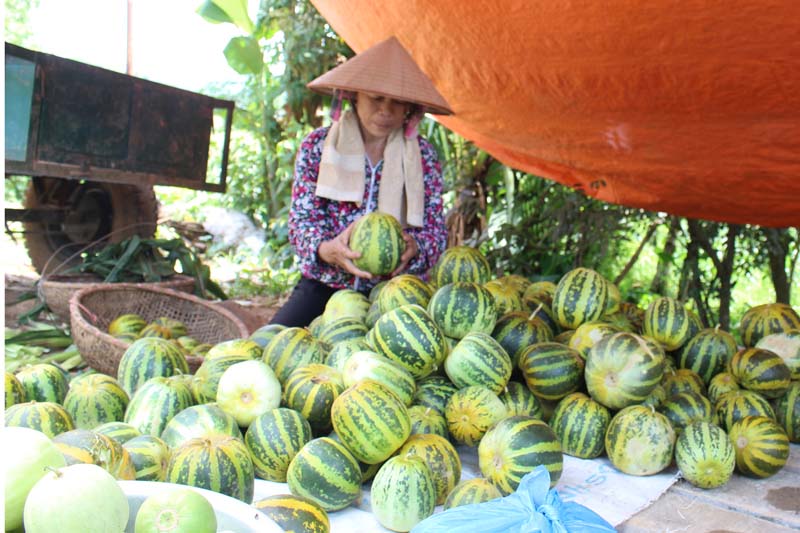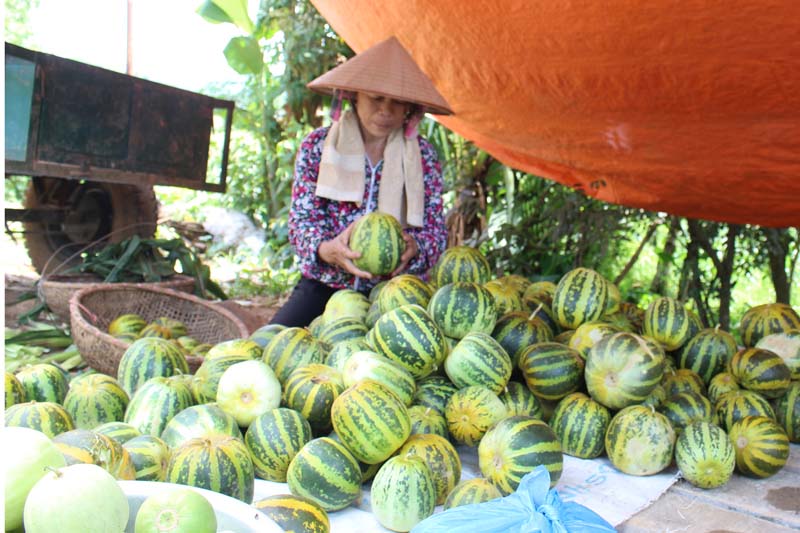
(HBO) – Since mid-April, a variety of farm produce have entered their main harvest time. This is a good time for customers to buy fresh products at prices only half or even a quarter of previous prices.

Farmers
in
Sao
Bay commune (Kim Boi) harvest melons for
sales at crowded sites.
Ms. Nguyen Thi Chiem from Cham Mat
ward (Hoa Binh city) said various kinds of vegetables and fruits are sold by
vendors at cheaper prices than those sold in the market. This season, housewives
have a lot of choices for delicious and nutritious food thanks to plenty of
agricultural products.
Along
National Road 12B in Kim Boi district and
National Road 21 in Tan Lac and Lac Son districts, there are hundreds of sites where
farmers sell various kinds of farm produce. Melons, watermelons,
cucumbers are among the most seen products. Mr. Thuan, a customer from Hoa Binh
city, said "On the way to Sam Son (Thanh Hoa) for holiday, we crossed Nam
Thuong, Sao Bay (Kim Boi) where I saw many people selling a lot of fruits. I
bought some to eat on my way. Everyone praised the fruits with prices at only half
of that in the city. So when we returned home, I stopped here to buy more to
eat and support the farmers at the same time.”
At Nghia Phuong farm market, prices
of vegetables and fruits have dropped remarkably compared to February and
March. Watermelons are sold at 8,000 VND – 10,000 VND per kilogram (previously
17,000 VND per kilogram); gourds 8,000 VND per kilogram, down from 15,000 VND;
cucumbers 6,000 VND per kilogram compared to 10,000 VND – 12,000 VND previously;
and mangos 20,000 VND per kilogram, down from 35,000 VND. Vegetables are
up to 50 percent cheaper. Only some fruits at the end of the season saw their
prices stable in the market such as Cao Phong (45,000 VND per kilogram).
According to Hoa Binh Department of
Agriculture and Rural Development, the province has over 1,200 hectares of
gourds and around 1,000 hectares of vegetables and herbs of all kinds./.
According to data from the Hoa Binh Provincial Party Committee, the industrial production index for the first six months of 2025 is estimated to have increased by 20% compared to the same period last year. This marks the highest year-on-year growth rate for this period since 2020.
In the first six months of 2025, Hoa Binh province’s export turnover was estimated at 1.145 billion USD, marking an 18.11% increase compared to the same period in 2024. Import turnover was estimated at $ 804 million, a 17.15% increase, which helped the province maintain a positive trade balance.
The lives of the ethnic minority farmers in Tan Lac district have gradually improved thanks to the new directions in agricultural production. This is a testament to the collective strength fostered through the professional associations and groups implemented by various levels of the district’s Farmers’ Union.
With the motto the "product quality comes first,” after nearly one year of establishment and operation, Muong village’s Clean Food Agricultural and Commercial Cooperative, located in Cau Hamlet, Hung Son Commune (Kim Boi district), has launched reputable, high-quality agricultural products to the market that are well-received by consumers. The products such as Muong village’s pork sausage, salt-cured chicken, and salt-cured pork hocks have gradually carved out a place in the market and they are on the path to obtaining the OCOP certification.
In the past, the phrase "bumper harvest, rock-bottom prices" was a familiar refrain for Vietnamese farmers engaged in fragmented, small-scale agriculture. But today, a new spirit is emerging across rural areas of Hoa Binh province - one of collaboration, organisation, and collective economic models that provide a stable foundation for production.
Maintaining growing area codes and packing facility codes in accordance with regulations is a mandatory requirement for agricultural products to be eligible for export. Recently, the Department of Agriculture and Environment of Hoa Binh province has intensified technical supervision of designated farming areas and packing facilities to safeguard the "green passport" that enables its products to access international markets.



